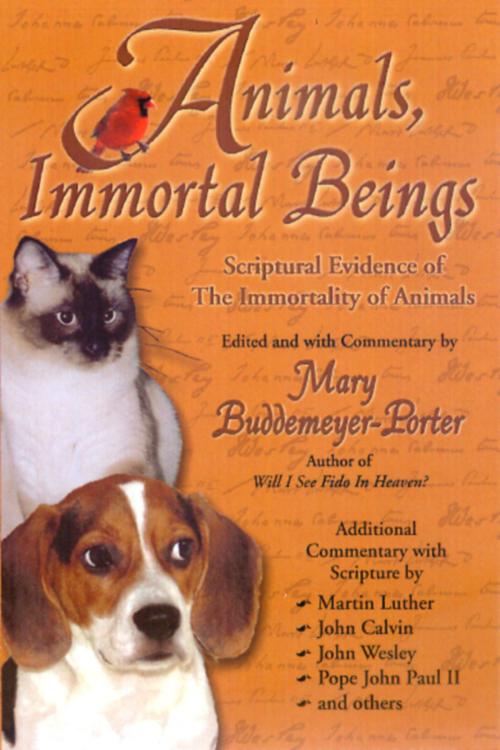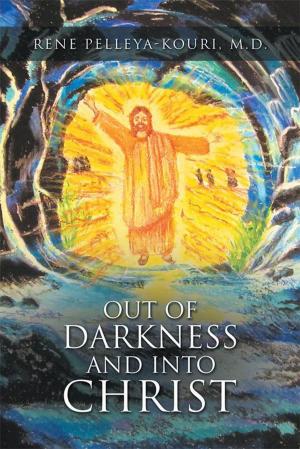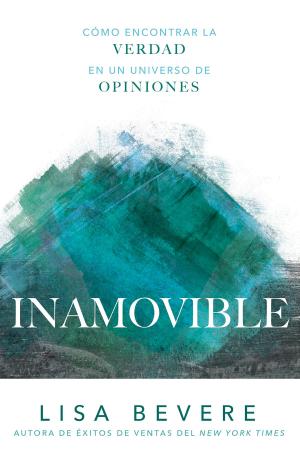Animals, Immortal Beings
Nonfiction, Religion & Spirituality, Inspiration & Meditation, Inspirational, Christianity, Christian Life| Author: | Dr. Mary Buddemeyer-Porter | ISBN: | 9781301666850 |
| Publisher: | Dr. Mary Buddemeyer-Porter | Publication: | May 20, 2013 |
| Imprint: | Smashwords Edition | Language: | English |
| Author: | Dr. Mary Buddemeyer-Porter |
| ISBN: | 9781301666850 |
| Publisher: | Dr. Mary Buddemeyer-Porter |
| Publication: | May 20, 2013 |
| Imprint: | Smashwords Edition |
| Language: | English |
Animals, Immortal Beings has become the leading resource of Christian books based on the immorality of for those seeking the confirmation by noted theologians of the past and present.
George MacDonald, author and pastor of “The Hope of the Gospel,” published in 1892 gives compelling insight into the mind of Paul, the writer of the Book of Romans. Concerning Romans 8:22 KJV. MacDonald interprets that to mean the apostle Paul regarded the whole visible creation as suffering in the process of its divine development, giving birth to a better self, a nobler world. It is not necessary to the idea that the creation should know what it is groaning after. The human race does not know its own lack, or to have even a far-off notion of what alone can stop its groaning.
“A god who would make the lower creatures only for prey with cruel masters torturing and killing them, a creator who endlessly creates creatures only to have them die for no self-good whatsoever, would not be the God we know of creation but a demon. But a creative demon is an absurdity.
MacDonald says, “To those who expect a world to come, I say, then, Let us take heed how we present ourselves to the creation which is to occupy with us the world to come. To those whose hearts feel compassion for creation, I say, ‘The Lord is mindful of his own, and will save both man and beast.”
Reverend Jeff Harker, Baptist minister and Theologian did extensive research on the spirit and soul of the animal after reading “Will I See Fido in Heaven/” which proposes that animals do have a soul and spirit. His dissertation “The
Spirit of the Animals” is the culmination of his commentary on the subject.
Rev. Harker writes, “The truth of the matter is that, throughout the centuries, most Christians have accepted the theory that animals do have immaterial souls or spirits. It wasn’t until the eighteenth century “Age of Enlightenment” and the thinking of men like Descartes and Hobbes that the existence of animal’s souls were even widely questioned in Western civilization. Throughout the history of the Christian church, the class understanding of living things has included the doctrine that animals, as well as humans, have an immaterial component to their essential being. This general understanding declined during the period of the 1700s. This period of “enlightenment” brought agnosticism and skepticism to much of Christian culture, emphasizing scientific method and rationalism as a bases for proving all truth. As a result of this tragic thinking there was a general rejection of biblical truth, and numerous commonly held beliefs fell by the wayside.
The most common belief two hundred years later is that animals don’t have souls or spirits. [There were those however throughout history who believed differently. Those who accepted the social cast system of the rich and the poor had a different view. The belief was that only the wealthy were favored by God, therefore those considered of a lower social level and animals would not be in heaven.] (MBP)
Dr. Albert Schweitzer stated, ”The fact that in nature one creatures may caused pain to another, and even deal with it instinctively in the cruelest way, is a harsh mystery that weighs upon us as long as we live. One who has reached the point where he does not suffer ever again because of this has creased to be a man.”
Pope John Paul II said, “The Gospel is the source of joy for all creatures, and above all for humankind.”
Pope John Paul II stated, “Animals possess a soul and men must love and feel solidarity with our smaller brethren.” “All animals are fruit of the creative action of the Holy Spirit and merit respect.” They are “ as near to God as men are.”
He concluded, “The work of redemption of man elevates creation to a new level. Christ swallowed up death through his resurrection.
Animals, Immortal Beings has become the leading resource of Christian books based on the immorality of for those seeking the confirmation by noted theologians of the past and present.
George MacDonald, author and pastor of “The Hope of the Gospel,” published in 1892 gives compelling insight into the mind of Paul, the writer of the Book of Romans. Concerning Romans 8:22 KJV. MacDonald interprets that to mean the apostle Paul regarded the whole visible creation as suffering in the process of its divine development, giving birth to a better self, a nobler world. It is not necessary to the idea that the creation should know what it is groaning after. The human race does not know its own lack, or to have even a far-off notion of what alone can stop its groaning.
“A god who would make the lower creatures only for prey with cruel masters torturing and killing them, a creator who endlessly creates creatures only to have them die for no self-good whatsoever, would not be the God we know of creation but a demon. But a creative demon is an absurdity.
MacDonald says, “To those who expect a world to come, I say, then, Let us take heed how we present ourselves to the creation which is to occupy with us the world to come. To those whose hearts feel compassion for creation, I say, ‘The Lord is mindful of his own, and will save both man and beast.”
Reverend Jeff Harker, Baptist minister and Theologian did extensive research on the spirit and soul of the animal after reading “Will I See Fido in Heaven/” which proposes that animals do have a soul and spirit. His dissertation “The
Spirit of the Animals” is the culmination of his commentary on the subject.
Rev. Harker writes, “The truth of the matter is that, throughout the centuries, most Christians have accepted the theory that animals do have immaterial souls or spirits. It wasn’t until the eighteenth century “Age of Enlightenment” and the thinking of men like Descartes and Hobbes that the existence of animal’s souls were even widely questioned in Western civilization. Throughout the history of the Christian church, the class understanding of living things has included the doctrine that animals, as well as humans, have an immaterial component to their essential being. This general understanding declined during the period of the 1700s. This period of “enlightenment” brought agnosticism and skepticism to much of Christian culture, emphasizing scientific method and rationalism as a bases for proving all truth. As a result of this tragic thinking there was a general rejection of biblical truth, and numerous commonly held beliefs fell by the wayside.
The most common belief two hundred years later is that animals don’t have souls or spirits. [There were those however throughout history who believed differently. Those who accepted the social cast system of the rich and the poor had a different view. The belief was that only the wealthy were favored by God, therefore those considered of a lower social level and animals would not be in heaven.] (MBP)
Dr. Albert Schweitzer stated, ”The fact that in nature one creatures may caused pain to another, and even deal with it instinctively in the cruelest way, is a harsh mystery that weighs upon us as long as we live. One who has reached the point where he does not suffer ever again because of this has creased to be a man.”
Pope John Paul II said, “The Gospel is the source of joy for all creatures, and above all for humankind.”
Pope John Paul II stated, “Animals possess a soul and men must love and feel solidarity with our smaller brethren.” “All animals are fruit of the creative action of the Holy Spirit and merit respect.” They are “ as near to God as men are.”
He concluded, “The work of redemption of man elevates creation to a new level. Christ swallowed up death through his resurrection.















